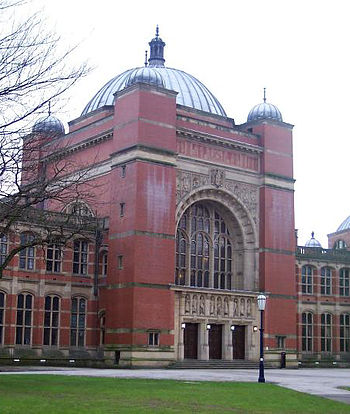 Birmingham University was founded in 1900. Located in central Birmingham, in the West of England, it has one of the UK’s largest and best university campuses. It is renowned for its excellent teaching and scientific research around the world. Well-known geologist, Li Siguang graduated from the university. The University of Birmingham is also a member of several international foundation research centre associations, organised by 21 internationally celebrated universities.
Birmingham University was founded in 1900. Located in central Birmingham, in the West of England, it has one of the UK’s largest and best university campuses. It is renowned for its excellent teaching and scientific research around the world. Well-known geologist, Li Siguang graduated from the university. The University of Birmingham is also a member of several international foundation research centre associations, organised by 21 internationally celebrated universities.
Birmingham is the UK’s second largest city and the heart of the British automobile industry. It is situated an equal distance from London, Manchester, Liverpool and Bristol. Birmingham City has been gradually urbanised through economic development, and the large tree-planted campus area is quiet and tranquil. Birmingham University has 22,500 students, including about 6,000 doctoral and postgraduate students and 3,500 international students from 120 countries. It offers international students a comprehensive welfare system. The percentage of overseas students at Birmingham University is 5%.
Rankings and Strengths
The Times ranked the University of Birmingham No. 20 in 2010.
In the UK Research Assessment Exercise (RAE) made by the Assessment Board of Higher Education, the University of Birmingham was ranked No. 5, and is a leading university in world-class scientific research for Chemistry, Psychology, Metallurgy and Anatomy.
Colleges
The University has 5 colleges: Arts and Law, Engineering and Physical Sciences, Life and Environmental Sciences, Medical and Dental Sciences and Social Sciences.
Courses for Undergraduates
- Arts and Law: Archaeology and Antiquity; Law, Law with Business; Law with French; Law with German; English; Drama; American and Canadian Studies; History and Culture; Languages; Culture; Art History and Music; Philosophy; Theology and Religion.
- Engineering and Physical Sciences: Chemistry; Chemical Engineering; Civil Engineering; Computer Science; Electronic, Electrical and Computer Engineering; Mathematics; Mechanical Engineering; Metallurgy and Materials; Physics and Astronomy.
- Life and Environmental Sciences: Biosciences; Geography, Earth and Environmental Sciences; Psychology; Sport and Exercise Sciences.
- Medical and Dental Sciences: Cancer Sciences; Clinical and Experimental Medicine; Dentistry; Health and Population Sciences; Immunity and Infection.
- Social Sciences: Accounting; Urban and Regional Studies;Economics, Management; Education; Government and Society; Social Policy.
Entry Requirements
- Bachelor’s degree; average college score – 80 or above.
- IELTS score of 6.5-7.0 or above. An IELTS score of 5.5-6.0 or above is required for the Natural Sciences and Engineering). The Language Centre offers language courses of 6-20 weeks.(EISU), provides three weeks of pre-school language courses. Only those holding an unconditional admission may apply.
Tuition Costs
Non-laboratory classes: £11,000 per year Laboratory classes: £13,950 per year Clinical: £20,300 per year
Living Expenses
Approximately £5,400 per year
Accommodation Fees
Student flat: £90-110 per week (including bills)
Private housing: £40-60 per week (bills equally shared)
